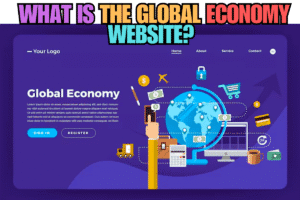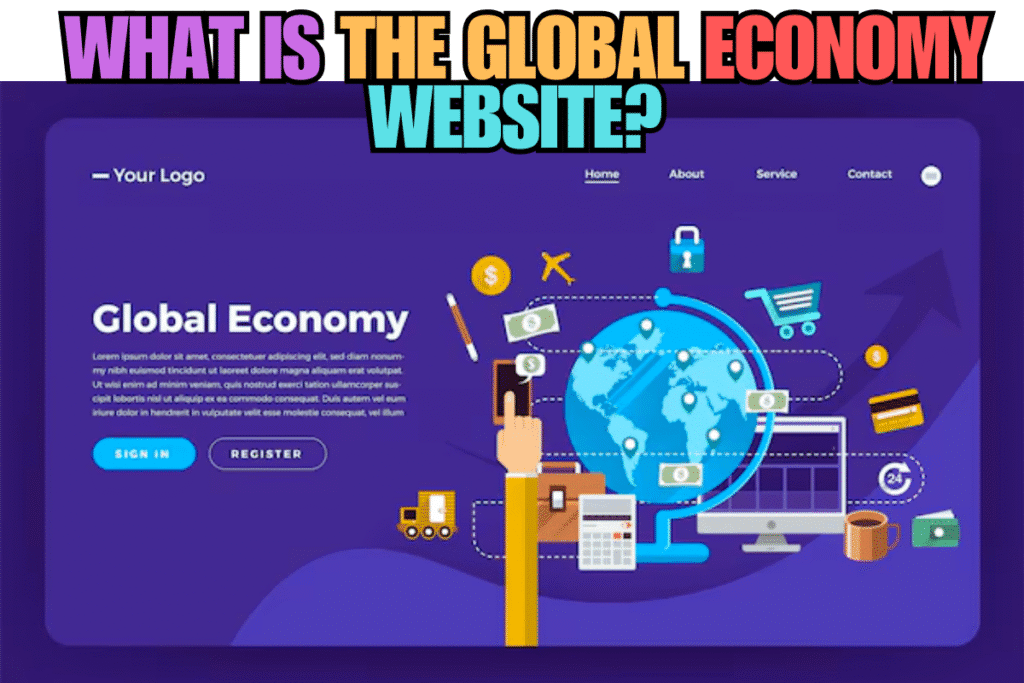In an increasingly interconnected world, understanding the ebb and flow of the global economy is no longer a niche interest – it’s crucial for investors, policymakers, business leaders, and even informed citizens. The question, then, becomes: What is the global economy website? If you’re picturing a single, all-encompassing portal with a neat dashboard summarizing the planet’s financial health, prepare for a nuanced answer. The reality is that the “global economy” is a multifaceted beast, and no single website can capture its entirety. However, a strategic combination of resources can provide a comprehensive and insightful view.
Having spent years navigating the digital landscape to understand global economic trends, I’ve learned that the key isn’t finding one magic website, but rather curating a dynamic toolkit of authoritative sources. This isn’t about a simple Google search; it’s about understanding the strengths and focuses of various international organizations, news outlets, and research institutions that collectively illuminate the complexities of the global economy.
The Pillars of Global Economic Insight
To grasp the big picture, it’s essential to turn to the institutions that are tasked with monitoring and analyzing the global economy. These websites are often primary sources of data, forecasts, and in-depth analysis.
-
The International Monetary Fund (IMF): Often cited as a key authority on global economic matters, the IMF’s website (https://www.imf.org/en/) is a treasure trove of information. Here, you’ll find their flagship World Economic Outlook reports, detailed country-specific analyses, data on global financial stability, and insights into international monetary policy. The IMF acts as a global financial watchdog and its website reflects this role, offering a macro-level perspective on the health and challenges facing the world economy.
-
The World Bank: Complementing the IMF’s focus on macroeconomic stability, the World Bank (https://www.worldbank.org/) concentrates on economic development and poverty reduction. Its website provides extensive data and research on developing economies, global poverty trends, and the impact of various development initiatives. For understanding the disparities and interconnectedness of global economic growth, the World Bank is an invaluable resource.
-
The Organisation for Economic Co-operation and Development (OECD): Primarily focused on the economies of developed countries, the OECD’s website (https://www.oecd.org/) offers detailed statistics, analysis, and policy recommendations across a wide range of economic and social issues. Its data portals and publications provide deep dives into the economic performance and policy frameworks of its member nations, offering a crucial perspective on the industrialized world’s contribution to the global economy.
The Pulse of the Market: Major Financial News Outlets
To stay current with the daily movements and unfolding trends in the global economy, reliable financial news websites are indispensable.
-
Bloomberg: A powerhouse of financial information, Bloomberg’s website (https://www.bloomberg.com/) offers real-time data, breaking news, and in-depth analysis of global markets, economies, and companies. While some content is behind a paywall, the free sections provide a comprehensive overview of the forces driving the global financial landscape. Its strength lies in its speed and breadth of coverage.
-
Reuters: Another leading global news organization, Reuters’ economics section (https://www.reuters.com/markets/economics/) provides objective reporting and analysis on macroeconomic indicators, central bank decisions, and global economic events. Its wide reach and journalistic integrity make it a go-to source for staying informed about the day-to-day developments shaping the world economy.
-
The Financial Times (FT): With a strong focus on international business and finance, the FT’s website (https://www.ft.com/world/global-economy) offers in-depth analysis and commentary on global economic trends, policy challenges, and market movements. Its insightful journalism and global perspective provide a deeper understanding of the complexities of the world economy.
Academic Rigor and Research Insights
For those seeking a more theoretical and research-driven understanding of the global economy, websites of academic institutions and research organizations are crucial.
-
The National Bureau of Economic Research (NBER): As mentioned in the context of domestic economics, the NBER (https://www.nber.org/) also publishes significant research on international trade, finance, and global economic issues. Accessing their working papers provides insights into cutting-edge academic thinking on the global economy.
-
Brookings Institution: This non-profit public policy organization conducts in-depth research and analysis on a wide range of global issues, including economic trends, development, and international cooperation. Its website (https://www.brookings.edu/topic/global-economy-development/) offers accessible and policy-relevant insights into the challenges and opportunities facing the global economy.
Beyond the Obvious: Niche Perspectives and Data Portals
To gain a truly comprehensive understanding, it’s beneficial to explore more specialized resources.
-
Trading Economics: This website (https://tradingeconomics.com/) provides a vast database of historical and current economic indicators for countries around the world. Its user-friendly interface allows you to track key data points like GDP growth, inflation rates, and unemployment figures, offering a granular view of individual economies within the global context.
-
Worldometer: While not strictly an economics website, Worldometer (https://www.worldometers.info/economy/) compiles data from various sources on global population, resources, and economies, offering a quick snapshot of key global metrics.
Building Your Global Economic Dashboard: A Personalized Approach
Instead of searching for a single “best” website, the most effective strategy is to curate your own personalized dashboard of global economic information. My own approach involves regularly checking the IMF and World Bank for major reports and forecasts, staying updated on daily news through Bloomberg and Reuters, and occasionally diving into the research from NBER or Brookings for a deeper understanding of specific issues.
For someone primarily interested in investment, a focus on Bloomberg, Reuters, and perhaps the FT might be more relevant. For a policymaker, the IMF, World Bank, and OECD websites would likely be primary sources. The key is to identify your specific needs and tailor your online resources accordingly.
The Importance of Critical Evaluation in a Global Context
Navigating the complexities of the global economy online requires an even greater degree of critical evaluation than when focusing on a single national economy. Different sources may have inherent biases based on their mandates, funding, or political leanings. Cross-referencing information from multiple reputable sources and being aware of potential perspectives is crucial for forming a well-rounded understanding.
For instance, a report from the IMF might have a particular focus on financial stability, while the World Bank’s analysis might emphasize poverty reduction. Understanding these institutional priorities helps in interpreting their findings within a broader global context.
Embracing the Complexity of the Global Economic Web
The answer to “What is the global economy website?” is that it’s not a singular destination, but rather a constellation of interconnected resources. By strategically leveraging the websites of international organizations like the IMF, World Bank, and OECD, staying informed through reputable financial news outlets such as Bloomberg, Reuters, and the FT, and delving into the research of academic institutions and specialized data providers, you can build a comprehensive understanding of the intricate workings of the global economy.
The digital age offers an unparalleled opportunity to access a wealth of information on this crucial topic. The key is to approach this vast landscape with curiosity, a discerning eye, and a willingness to synthesize information from multiple perspectives to unravel the complexities of our interconnected financial world.
What are your go-to websites for understanding the global economy and why? Share your recommendations and insights in the comments below!



